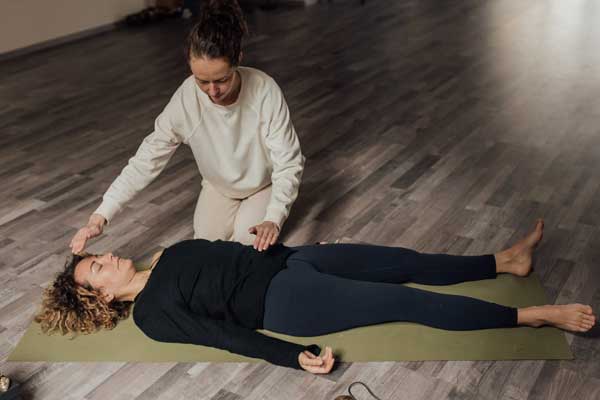As someone practicing yoga for years, I have seen firsthand the transformative power it can have on the mind and body.
It is no wonder that yoga therapy has become an increasingly popular way to help people heal from physical and emotional ailments.
In this guide, I will explore what it takes to become a yoga therapist and how to build a successful practice.
Introduction to Yoga Therapy
Holistic therapy uses yoga, postures, breathwork, and meditation to help individuals manage or overcome physical and emotional conditions.
Yoga therapy can alleviate anxiety and depression, manage chronic pain, and help with addiction recovery.
What sets yoga therapy apart from a traditional yoga class is that it is tailored to the individual’s needs and health concerns.
What is a Yoga Therapist?
A yoga therapist is a trained professional who uses yoga practices to help individuals achieve their health goals.
They work with clients one-on-one or in small groups to assess their needs and create a personalized yoga practice.
A yoga therapist may work with clients with injuries, chronic illnesses, or mental health conditions.
To become a yoga therapist, one must complete specialized training beyond a basic yoga teacher training program.
This training is typically more intensive and includes anatomy, physiology, and psychology coursework and hands-on experience working with clients.
Benefits of Becoming a Yoga Therapist
Becoming a yoga therapist can have many benefits, both for the therapist and their clients. For the therapist, it can provide a deeper understanding of yoga and its applications and a sense of fulfillment in helping others.
It can also be a way to expand their career opportunities beyond teaching regular yoga classes.
Working with a yoga therapist can give clients a more personalized approach to their health and wellness.
It can also complement traditional medical treatment effectively, as yoga therapy can help alleviate symptoms and improve overall well-being.
Educational Requirements for Becoming a Yoga Therapist
To become a yoga therapist, one must complete a basic yoga teacher training program, typically lasting 200 or 500 hours.
After completing this program, one can pursue specialized training in yoga therapy. This training can vary in length and requirements but typically involves at least 800 hours of coursework and hands-on experience.
The International Association of Yoga Therapists (IAYT) has established educational standards for yoga therapy programs, which include coursework in anatomy, physiology, and psychology, as well as a minimum number of hours working with clients.
Choosing a program that the IAYT accredits is important to ensure it meets these standards.

Certification and Accreditation for Yoga Therapists
After completing a yoga therapy program, one can pursue certification as a yoga therapist.
The IAYT offers a certification program for yoga therapists who have completed at least 800 hours of training and meet other requirements, such as a certain number of hours working with clients.
It is important to note that certification is not required to practice as a yoga therapist, but it can provide credibility and recognition within the field.
It is also essential to maintain continuing education credits to keep up-to-date with the latest research and techniques in yoga therapy.
Continuing Education for Yoga Therapists
Continuing education is an essential part of being a successful yoga therapist. It is crucial to stay up-to-date with the latest research and yoga therapy techniques to provide clients with the best possible care.
The IAYT requires certified yoga therapists to complete a certain number of continuing education credits every three years to maintain their certification.
Continuing education can take many forms, including workshops, conferences, and online courses. Choosing courses that align with one’s areas of interest and expertise is essential to provide the most value to clients.
Skills and Qualities of a Successful Yoga Therapist
To be a successful yoga therapist, one must possess specific skills and qualities. These include:
- Compassion and empathy for clients
- Excellent communication and listening skills
- Knowledge of anatomy, physiology, and psychology
- Ability to tailor yoga practices to individual needs
- Patience and dedication to helping clients achieve their goals
It is also crucial for yoga therapists to maintain their yoga practice to stay grounded and connected to the practice.
How to Build a Successful Practice as a Yoga Therapist
Building a successful practice as a yoga therapist takes time and dedication.
Establishing oneself as a credible and knowledgeable professional within the field is essential. This can be done by:
- Obtaining certification as a yoga therapist
- Continuing education to stay up-to-date with the latest research and techniques
- Building a referral network of healthcare professionals and other yoga therapists
- Creating a professional website and social media presence
- Providing excellent care and results for clients
Resources for Becoming a Yoga Therapist
There are many resources available for those interested in becoming a yoga therapist. These include:
- Yoga therapy training programs accredited by the IAYT
- The IAYT’s certification program for yoga therapists
- Continuing education courses and workshops
- Professional associations, such as the IAYT and the Yoga Alliance
Conclusion
Becoming a yoga therapist is a rewarding and fulfilling career path for those passionate about helping others.
It requires specialized training, ongoing education, and specific skills and qualities.
By following these guidelines and building a solid reputation within the field, one can make a successful practice as a yoga therapist and positively impact their clients’ lives.
